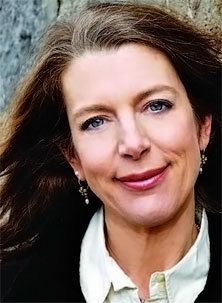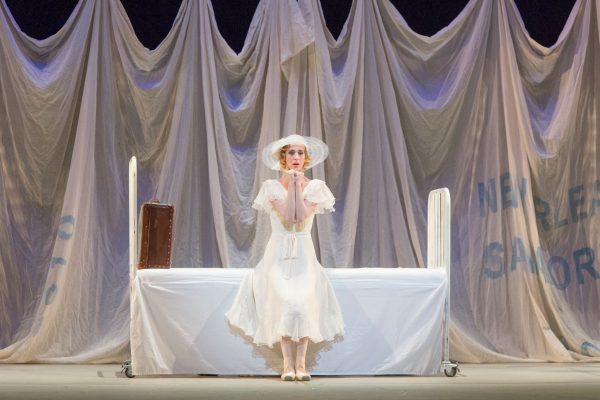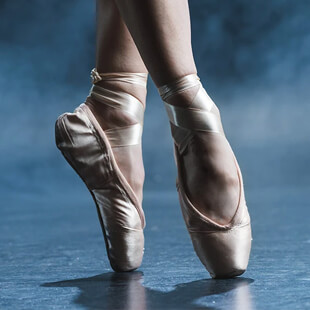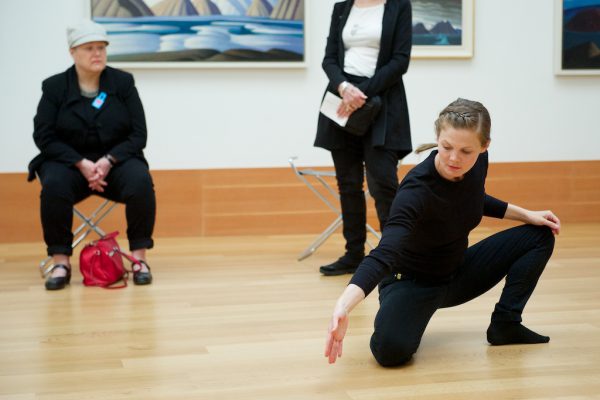The pinnacle of Opera Atelier’s Angel, now streaming online until Nov. 12, comes about three-quarters of the way into the 70-minute film. The moment doesn’t involve headliner Measha Brueggergosman, glorious as she may be. (If her mellifluous voice can’t open the gates of heaven, I don’t know what will.)
Neither does it include the rapturous Tafelmusik Orchestra, nor the superb 16-member Atelier Ballet under the deft leadership of Jeannette Lajeunesse Zingg, whose made-for-film choreography has grown increasingly audacious with each successive production during this pandemic-induced pause from the stage.
Rather, the show’s dramatic high point is also its most intimate moment: a “pas de deux” between violinist Edwin Huizinga, who is also the project’s composer, and contemporary dancer Tyler Gledhill.
Huizinga, standing in the middle of Gerard Gauci’s cosmic set, which is imprinted with various constellations, plays a plaintive piece on the violin. There are hints of Bach and Handel in its simple melodic lines, punctuated with moments of ornamental trills. But while the Canadian composer’s music definitely does not have the discordant atonalism that is the hallmark of the postmodern movement, Angel is also distinctly contemporary in its minimalism and the way it plays with musical form.

Huizinga’s compositions perfectly blend the 17th century with the present – a hybrid of the sonically familiar and unfamiliar.
Orbiting Huizinga is Gledhill, who glides and lunges with outstretched arms around the set – or rather, the historic St. Lawrence Hall, which is unrecognizable thanks to Gauci’s atmospheric lighting palette that experiments with shadows and flashy neon lights. Gledhill’s solo work is contemporary but grounded in the style of classical ballet.

The scene succeeds in its simplicity. In a work that incessantly, and frustratingly, toggles between opera and ballet, the pas de deux refreshingly eschews the confines of those art forms.
Like Huizinga’s music, Gledhill’s blending of various styles is symbolic of Angel as a whole. The work – billed as a multidisciplinary storytelling event – is not a narrative but rather a rumination on various biblical themes: creation and loss, redemption and betrayal, glory and suffering.
Huizinga, along with director Marshall Pynkoski, has plucked various poems from Rilke’s catalogue and text from John Milton’s Paradise Lost and set them to music. And two movements from Recomposed by Max Richter: Vivaldi – The Four Seasonsserve as the backing track for a pair of dance segments featuring the Atelier Ballet.
If all this sounds rather disjointed, it’s because it is. Angel suffers from a lack of a backbone – thematic, stylistic or otherwise – to pull its various segments together to form a cohesive whole. That’s not to say, however, that there aren’t moments of brilliance sprinkled throughout.
Take, for instance, Douglas Williams. After a scorching turn as Lucifer earlier this summer in Opera Atelier’s filmed production of Handel’s The Resurrection, the bass-baritone is back as the fallen angel. His Lucifer in this production, however, is more layered and nuanced than before – evoking pathos, even sympathy, from the audience as he laments his fall from heaven.
He’s often joined onscreen by the luminous Brueggergosman, whose stalwart, dignified archangel is the antithesis of Williams’ maniacal, barn-burning Lucifer. Aching and disturbing, their final scene together is an ending I won’t soon forget.

The rest of the cast, though in smaller roles, is equally impressive. Colin Ainsworth sings “Of man’s first disobedience,” Milton’s first lines in Paradise Lost; John Tibbetts and Meghan Lindsay come together as Adam and Eve; and Mireille Asselin and Jesse Blumberg are a virgin and an angel, respectively.
At various times, they’re all backed by the Nathaniel Dett Chorale who, under the direction of Brainerd Blyden-Taylor, add a robust majesty to Huizinga’s compositions.
None could surpass Brueggergosman, however. She also treated those who attended the physically distanced opening night gala at TIFF Bell Lightbox to a three-song set before the start of the film. After months of viewing mostly amateur digital recordings, her live performance was a sight for sore eyes.
Zingg and the Atelier Ballet dancers are also doing some fine work. In one eye-popping moment, the corps de ballet traverse the stage in sharp rows, with militaristic precision, as Richter’s gratingly dissonant Winter 1 plays in the background. But as the solo violin enters (a spritely Elisa Citterio, who is also Tafelmusik’s music director) and sprinkles bursts of colour over the biting harmonies, the corps pops with energy as well – with dancers leaping into échappéslike thunderous bolts of energy cracking an unblemished sheet of ice.

But even with the wonderful Atelier Ballet, Huizinga’s glorious compositions and a first-rate cast who gives voice to them, Angel never really comes together. You’re left marvelling at its constituent parts but rarely at the whole work.
Perhaps it’s overstuffed. When Angel premiered four years ago, then known as Inception, it was merely the pas de deux between Huizinga and Gledhill. Over multiple productions, the text by Milton and Rilke were added, in addition to Richter’s Recomposed.
These source materials don’t naturally blend into one satisfactory product. If Milton’s narrative and character-driven poems are like a Monet painting, Rilke’s metaphorical, broad-stroked works are more akin to a Basquiat.

Filmographer Marcel Canzona’s vision almost brings the entire piece together. The shots are sometimes sweeping and at other times incredibly intimate. The decision to shoot largely in black and white accentuates the dichotomy of good and evil that is central to the story. But some poorly rendered special effects of various galactic objects detract from some otherwise solid cinematography.
In all, Angel certainly soars – and is a welcome departure from Opera Atelier’s traditional baroque opera productions – but it never quite reaches the heavens.
Tagged:






